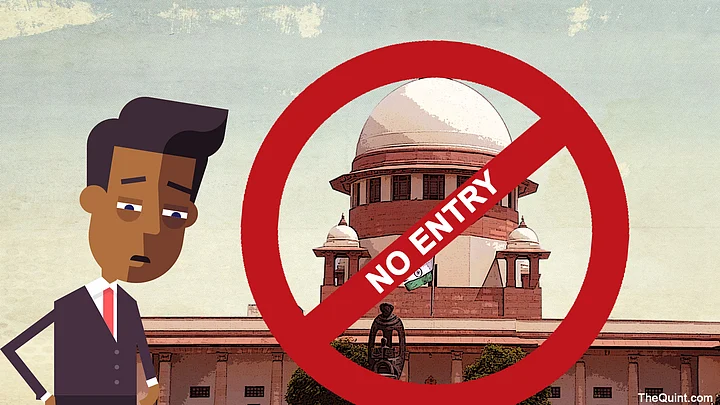A study in 2012 revealed that India has over 1,200 law schools, which train over lakhs of students across the country. As a part of the curriculum prescribed by the University Grants Commission and Bar Council of India (Rule 25, BCI Rules, 2007), every student is required to intern during the academic year.
Such internship experiences essentially include a visit to the courts. Truth be told, there is no bigger joy a student can get than seeing stalwarts of the legal profession arguing in the Supreme Court and the high courts. However, despite the BCI mandating the same, the attitude of courts has been very cold towards the law interns.
‘Interns Are Not Allowed’
Signs like ‘interns are not allowed’ are placed in bold font at the high court canteens. The apex court clearly prohibits interns from entering the premises on Mondays and Fridays as well. The justification that the interns overcrowd the place is weak in comparison to the fact that all leading cases are heard on these two days, therefore denying interns entry on those specific days defeats the very objective of a legal internship.
While this paints only a singly instance, the courts have remained sub rosa with regard to the court proceedings. The ex-chief justice of India, heading a three-judge bench clearly laid down that there can be no recording of the court procedures.
Should Interns Be Allowed Inside Courts?
- August 2015: Supreme Court bans
the entry of law interns after it received an anonymous threat mail.
- Rules by the Bar Council of
India prescribe an internship for a period of 12 weeks in case of three-year
course and 20 weeks in case of a five-year course.
- January 2015: A 3-judge bench
headed by former chief justice HL Dattu refuses to allow video recording of
court proceedings.
- With no access to the courts or
live footage of the court proceedings, law interns suffer as they are unable to
keep tab on daily hearings at the courts.
Recording the Court Proceedings
Such a stand clearly restricts every citizen from knowing what occurs within the walls of the courts. While the news agencies do report the same, there have been instances when the happenings in the court were misreported. While the author does not choose to refute the rationale behind prohibiting the recording of court proceedings, the apex court still needs to pay heed to the interests of these budding lawyers and avoid hindering their learning. The argument for the same is two-fold.
First, the prohibition by the apex court goes against the BCI rules and hinders the process of learning. Second and the most important reason is the public nature of court proceedings, which are conducted by using public money.
The fact that the public (let alone law interns) gets no access to the proceedings of the court, appears to be blatantly unjust. However, the real question is regarding the solution to this problem.
Giving Access to Law Interns
The precedents laid down in other countries around the world comes of assistance. There was a time when members of the general public could not listen to the court proceedings in the United States of America. However, the same changed when the Supreme Court in Bush v. Gore allowed live radio broadcasting of the court proceedings, something the Indian apex court can resort to doing.
Additionally, the medium adopted by the Canadian Supreme Court can also be followed, wherein it allows the televising of the oral arguments in the court via its national channels. The security concern of the courts are not affected here as even the Parliament allows live streaming of the proceedings. Specifically for the law interns, a facility can be created in the court premises where live access to the court proceedings can be witnessed by them.
While interning, one of my seniors once told me that majority of learning happens in the court, when you see seniors in the profession arguing. By keeping interns from witnessing that, the court hampers their growth and learning. Let’s hope that the apex court considers the future of the legal profession, which rests in the hands of today’s interns. Perhaps only then can we hope for the Indian legal fraternity as a whole to stand to gain.
(Source: Times of India)
(The author is a law student at the National Law University, Jodhpur. He can be reached S_Tripathi07. This is a personal blog and the views expressed above are the author’s own. The Quint neither endorses nor is responsible for the same.)
(At The Quint, we question everything. Play an active role in shaping our journalism by becoming a member today.)
